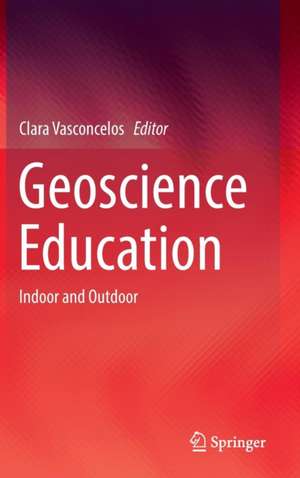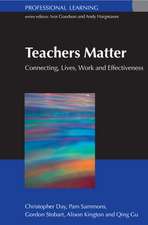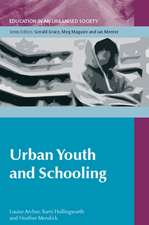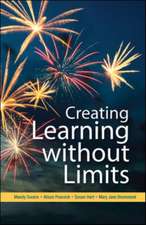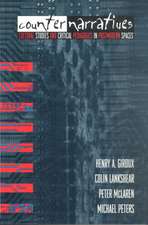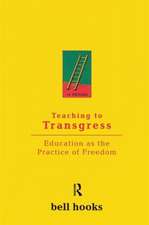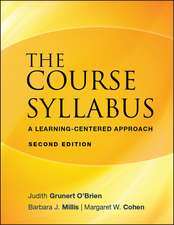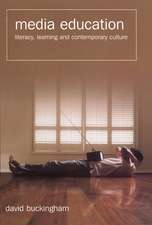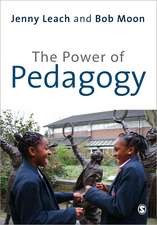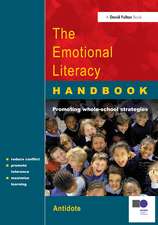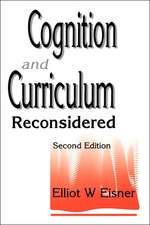Geoscience Education: Indoor and Outdoor
Editat de Clara Vasconcelosen Limba Engleză Hardback – 21 noi 2016
Throughout the book readers can find research-based arguments illustrated with practical examples, which will help them to innovate in their curriculum development area, classroom practices and pre and in-service teachers’ education. The book challenges readers to improve Geoscience Education by changing the ways of teaching, by enabling students to exploit their natural curiosity, and by spurring a learning process that should not be confined to the classroom but rather maintained throughout life.
| Toate formatele și edițiile | Preț | Express |
|---|---|---|
| Paperback (1) | 638.11 lei 6-8 săpt. | |
| Springer International Publishing – 24 iun 2018 | 638.11 lei 6-8 săpt. | |
| Hardback (1) | 644.30 lei 6-8 săpt. | |
| Springer International Publishing – 21 noi 2016 | 644.30 lei 6-8 săpt. |
Preț: 644.30 lei
Preț vechi: 758.01 lei
-15% Nou
Puncte Express: 966
Preț estimativ în valută:
123.31€ • 127.75$ • 102.90£
123.31€ • 127.75$ • 102.90£
Carte tipărită la comandă
Livrare economică 21 martie-04 aprilie
Preluare comenzi: 021 569.72.76
Specificații
ISBN-13: 9783319433189
ISBN-10: 3319433180
Pagini: 282
Ilustrații: XI, 236 p. 66 illus.
Dimensiuni: 155 x 235 x 16 mm
Greutate: 0.53 kg
Ediția:1st ed. 2017
Editura: Springer International Publishing
Colecția Springer
Locul publicării:Cham, Switzerland
ISBN-10: 3319433180
Pagini: 282
Ilustrații: XI, 236 p. 66 illus.
Dimensiuni: 155 x 235 x 16 mm
Greutate: 0.53 kg
Ediția:1st ed. 2017
Editura: Springer International Publishing
Colecția Springer
Locul publicării:Cham, Switzerland
Cuprins
Preface: Nilza Costa.- Introduction: Clara Vasconcelos.- I. 1– Fostering deep understanding through the use of geoscience investigations, models and thought experiments – the Earth Science Education Unit and Earthlearningidea experiences, Chris King.- I.2 –Science Models: How can teachers use them in geoscience classes? Joana Torres & Clara Vasconcelos.- I.3 – Simulating an earthquake and its effects on soils and buildings: A practical activity to teach and disseminate geoscience, Sara Moutinho; Rui Moura &Clara Vasconcelos.- II.1. Earth systems education and the development of environmental insight, Nir Orion.- II.2 -Field classes for Geosciences Education: teachers’ concepts and practices, Celeste Romualdo Gomes, Armando F. Rocha, Joaquim A. Ferreira,Ana Rola.- II.3- The importance of geology as a contribution to the awareness of the cultural heritage as an educational resource, Ana Moutinho & Ângela Almeida.- II.4. Exploring rocks and minerals: An experience of integrated educational approach, Ana V. Rodrigues, Patrícia João, Isabel P. Martins,.- II.5. Fossils, smartphones, geodiversity, internet and outdoor activities: A technological geoeducational bundle, Carlos Marques da Silva.- III.1- An interdisciplinary approach to teach Geoscience, Arlino Camargo Livério Jr., Eduardo M. Santos, Adriana P. B. Tufaile, Alberto Tufaile, Carlos Molina Mendes, Rosely Aparecida Liguori Imbernon.- III.2- Textbooks: A tool to support geoscience learning, David Brusi, Amélia Calonge, Edson De Souza.- III.3. Promoting STS/CT Orientation in Basic Education, Rui Marques Vieira, L. F. Moreira, Celina Tenreiro-Vieira.- III.4 Geomedicine and History of Science: A contribution to scientific culture, Isilda Rodrigues, Joana Torres, Paulo Favas.- III.5 Education and Geoethics: Three fictional life stories, Clara Vasconcelos, Maria Luisa Vasconcelos, Joana Torres.
Notă biografică
Department of Geoscience, Environment and Spatial Landing
Unit of Science Teaching
Faculty of Science of University of Porto (FCUP)
Textul de pe ultima copertă
This book presents research in Geoscience Education focusing on indoor and outdoor environments in which teaching geoscience gains particular relevance, significance and contextualization. The research areas that are presented throughout the thirteen chapters cover a wide variety of subjects ranging from educational resources and fieldwork to science models. Chapters discuss specific geoscience topics such as earthquakes, rocks, fossils and minerals. Other chapters present a more interdisciplinary approach addressing topics that aren’t usually examined, such as geomedicine and geoethics, with a specific focus on sustainable development and their alignment with the school curricula.
Throughout the book readers can find research-based arguments illustrated with practical examples, which will help them to innovate in their curriculum development area, classroom practices and pre and in-service teachers’ education. The book challenges readers to improve Geoscience Education by changing the ways of teaching, by enabling students to exploit their natural curiosity, and by spurring a learning process that should not be confined to the classroom but rather maintained throughout life.
Throughout the book readers can find research-based arguments illustrated with practical examples, which will help them to innovate in their curriculum development area, classroom practices and pre and in-service teachers’ education. The book challenges readers to improve Geoscience Education by changing the ways of teaching, by enabling students to exploit their natural curiosity, and by spurring a learning process that should not be confined to the classroom but rather maintained throughout life.
Caracteristici
Introduces methodologies that facilitate the learning process in geoscience education Discusses the importance of non-formal education spaces in geoscience education Explores the role of geological knowledge in society
